Hello,
There are a few things here to discuss. First the black UV light as a diagnostic test is not confirmatory. Second if he is not responding as expected I would be concerned that there is another problem making this lack of response difficult. Lastly in my experience it can take months to resolve.
If you feel like your cat isn’t doing as well as you hoped you can ask for a referral to a dermatologist.
If you would like to try the oral antifungal medication you can also ask for this to be considered again by your vet. In some cases it does help patients but we are always trying to avoid potentially causing any adverse reactions by taking the most conservative approach to every condition.
We learned this week that our 9yo female domestic cat FIV+ has bilateral ear canal polyps more severe on the right. Our local vet does not perform the surgical removal of these polyps. How to find a vet to perform surgery or a dermatology specialist? A video otoscopy was recommended. In Maryland, Harford County. Willing to travel though don’t want to stress cat out too much with a looonnggg ride. Thanks in advance.
I have a very special and painful case I need help with, I have tried several different veterinarians with no diagnosis or prognosis so far. It may be a long shot, but I was hoping you could help me shine a light on this.
In April I found an extremely skinny stray cat and took him in. I first thought he was malnourished from lack of food for being in the streets, but 4 months in his case keeps unfolding.
He is likely older than 15 years old, but he’s a happy cat with a lot of energy and mobility. He weighs 3kg but he’s a big cat, you can feel every single bone in his spine, although you can’t see them that easily because he has long hair. He’s completely affectionate, loves to be pet, and asks very politely for attention and food all the time.
All we know about his past is he is neutered, he had some teeth surgically removed and he tested negative for FIV and FeLV.
He had a huge appetite when I first took him in, he would eat 100g of food in one meal and ask for more right after. He would sometimes ‘cough’, it sounded like he was choking on some kind of fluid, it doesn’t happen in sequences, but it happens almost every day until today.
He always drank LOTS of water and produced a lot of urine as well. His feces at the beginning were really solid with some mucus.
After a month, he continued to eat plenty and hadn’t gained any weight, that’s when he started to throw up. It started happening a few days a week, usually after spending several hours without eating he would throw up a clear frothy fluid with no content, and then it progressed to twice every day regardless of when he had eaten.
We suspected it could be diabetes or hyperthyroidism, but the labwork didn’t confirm either, it showed regular kidney function with small liver function alterations.
We then introduced prednisolone (2,5mg/day) and changed his diet from a mix of natural home-cooked protein, hypercaloric wet food, protein supplements, and dry food to exclusively Royal Canin Hypoallergenic while waiting for Royal Canin Gastrointestinal Hydrolyzed Protein to arrive in Brazil, keeping Omega 3 (fish oil) 500mg/a day in his diet.
Vomits went away for a while. He kept drinking lots of water and peeing a lot, but his feces got softer (not liquid).
He had periods where he lost his appetite, which we treated with mirtazapine, he reacted after 6 days.
We performed an ultrasound and discovered that basically all his internal organs were compromised. He has severe alterations everywhere. Still, the best specialists I could find couldn’t tell me what was causing it and offer a course of treatment that didn’t involve opening him up to collect tissues for a biopsy.
I personally think it is absurd that a doctor could look at this frail elderly cat who obviously can’t resist anesthesia without serious risks and say that surgery is the only way to go, all to find out for sure if we’re dealing with a lymphoma or an infection. I’m looking for someone to advise me on the most effective course of action. Of course, I aim to reverse his condition, but I understand that given his age and how advanced it is, it might not be an option.
He is currently at 3kg, eating exclusively Royal Canin Gastrointestinal Hydrolyzed Protein with fish oil, and taking prednisolone every day for a month now. His appetite is healthy, he still drinks a lot, pees a lot, and poops regularly but softer. He eats an average of 5 small meals.
Vomits are back down to a few times a week, usually early in the morning before his first meal, and always a clear liquid. He goes and eats right after throwing up so I get the impression he is not nauseous.
He doesn’t seem to be in pain overall.
He’s not gaining any weight regardless of all my efforts.
That is why I’m giving this a shot and trying to get your attention. I hope you have more resources and knowledge that could help me figure out appropriate next steps to give this little guy the best fighting chances I can.
On this link you’ll find a translation of his bloodwork and ultrasound. I had chat GPT translate it for me so forgive me if there are errors.
Link: https://docs.google.com/document/d/1yqcen-TYzyvfBYU-J4t1tCHola1E2otDGDa1H7V032Y
I appreciate any support you can lend me, his name is Valentim which means brave and strong, and I want him to win this fight.
Comments
Hi! We’ve adopted an old cat who was previously a stray, he has hyperthyroidism and is underweight (6.5 pounds at last vet checkup a month ago). He’s been getting better in most aspects (his labs are normal now, no FIV, etc), but he’s been fighting ringworm consistently since January. We’ve done regular rounds of lime sulfur dip, miconazole spray and baths, and pretty constant environmental spore cleaning (regular laundry, Rescue antifungal spray, cleaning/vacuuming) for 2 months but he keeps picking it back up. We’ve been UV lighting him often, and when it finally seems to be going away a new spot pops up!! Any tips? We were initially discouraged from getting the prescription oral antifungal med for him due to his health fragility at first, but with his labs more normal and a higher weight would the systemic medication help?
Comments
Hi there, I wanted to ask if polyps in the throat can be felt. My kitten that can’t meow I suspect of having polyps. The vet tested for Leukemia and FIV negative, xrays negative, and lung worm negative. Now I notice both sides of her neck has lump, one side bigger. My other kittens do not have these lumps. My vet said she doesn’t think it’s polyps because that’s uncommon in kittens, so $500 in tests later and I have no answers. Shouldn’t they have noticed these lumps? They are the size of a small marble.
Comments
I work front desk at a vet and a client brought in a stray. No chip and shelters wouldn’t take her. She was going to be released outside since no one would home her and it’s so cold in VA.. so I took her in. I got her shots and tested for FIV, FeLuk, etc to know if she’s safe around my 10 yr neutered male cat. Then the vet said she seems to be pregnant but the ultrasound was inconclusive. But she definitely matches the description of “pinking” and has no hair around her nipples. But I have no idea how far along she is! Last week we didn’t see kittens on ultrasound but now they think she looks pregnant for sure. How do I know? Vet doesn’t want to stress her with more imaging. Also, what do I do when she goes into labor?? Will my male cat be okay around her? They’ve been ok the few times I’ve let them interact but will she change personality when she has kittens? Is she’s likely nicer now than she’ll be after just since she’s “nesting”? Is the stress too much to introduce her to my cat? She’s scratching through the door to get to the rest of the house so I’d like not to keep her cooped up 24/7. Also, when do I know labor is starting? Will she pick a place? How can I make that not be the bed or couch? Or can I cover them? And she eats like she’s STARVING! She looks so tiny to be pregnant.. I read you feed them all they want at a certain point; when is that? How much should I give her each stage? I have Hills ultimate care adult. I went ahead and got some Iams kitten food but when do I start mixing it in? I’m even more lost not knowing how far along she is. I’ve had her 1 week so at least that far along but I could use as much help as possible. Especially regarding labor. I know she’ll most likely do it all on her own but I see so much of what can go wrong working at a vet and I’d like to be prepared. I’ve attached pictures of her. Please help me help her.
Comments
Comments
Hi Dr. Magnifico. You are our vet to our indoor cats. Last week, we brought in a feral cat that was roaming our neighborhood. Turns out, he is pretty friendly, allows petting and belly rubs. On Monday June 19th, I took him to Animal Rescue, Inc., to be neutered, a rabies shot, and flea control. They also checked for a microchip (none), and I paid to have blood work done to have him tested for feline leukemia. Unfortunately, he tested positive for FIV. I would like to find him a home. I have two questions. Do you know anyone willing to give a home to a big orange friendly male tabby cat, or is there anything you can do to help? Maybe doing a courtesy post on your facebook page? I asked Animal Rescue and was told to put him back outside since he is now neutered. I was shocked they said that, as he could infect other ferals. We are currently keeping him in our basement and I just noticed a tapeworm coming out of his anus. My second question is, can you prescribe a tapeworm medication, without me having to bring him in, since he is FIV feral, and just went thru so much at Animal Rescue? My husband can pick it up after work. If not, can you recommend an over the counter medication to treat tapeworms? I am hoping whatever it is, that it will be something easy to give, maybe something I can put in his food that is tasteless. Thank you. Terri














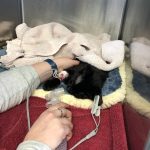

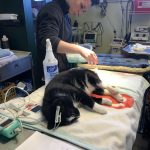
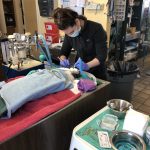

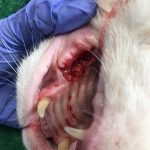
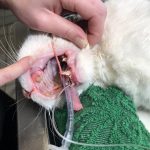
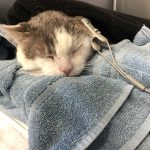


Hello,
It sounds like you have done a pretty thorough work up. The places I think that you should look into are;
Repeat the blood work. It sounds like hyperthyroidism. I always check a free T4 on top of the thyroid T4. I also check a urine. If you haven’t sent a fecal to the lab too.
After that the ultrasound and X-rays are where I look.
You are still at the place where the diagnosis is eluding you. That’s where you need to focus.
PS. Just for the record I don’t love starting pred until you have a diagnosis. It can obscure your diagnostics.
Good luck. I hope this helps.